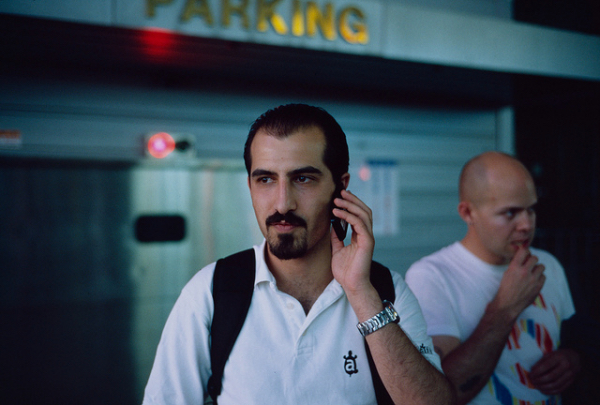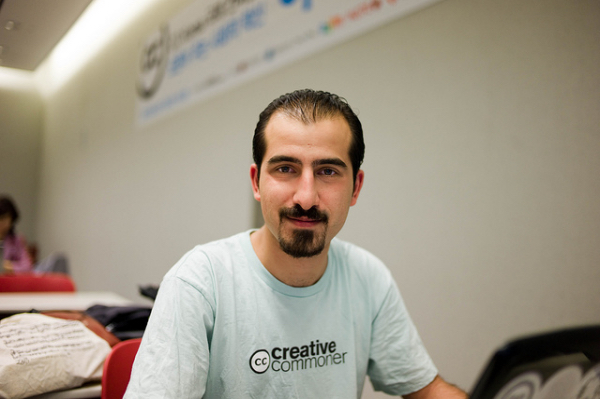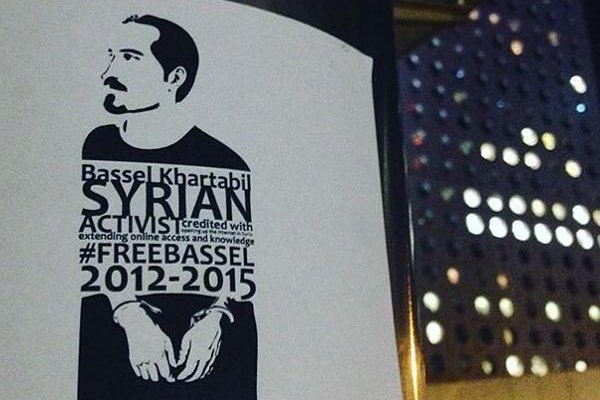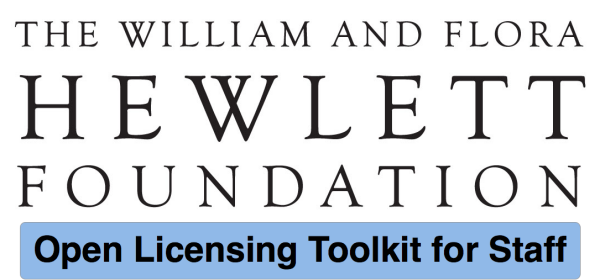The original article was written by Stéphanie Vidal in Slate.fr. It has since been published under a Creative Commons Attribution 4.0 International license. Please attribute author Stéphanie Vidal and Slate.fr as the place of first publication by linking to the original article. The following has been translated into English by Philippe Aigrain, Mélanie Dulong de Rosnay, and Jean-Christophe Peyssard. The translated source text is available here.

Bassel Khartabil by Christopher Adams, CC BY 2.0.
Known worldwide as a free Internet defender and an Open Source culture promoter, he has been detained for three years and a half by the Bashar al-Assad regime and has been transferred from Adra prison to an unknown place on 3 October 2015. On October 10th, his wife has been informed that his name has been deleted from the prison register, without further information on where he could be. None of the parties involved recognizes they have him or not.
Bassel Khartabil, 34, a fervent defender of a free Internet and promoter of open source culture, has been held prisoner since 15 March 2012 in the jails of the Syrian regime of Bashar al-Assad. According to the opinion of the Working Group on Arbitrary Detention during its 72nd session held in Geneva in April 2015, he had been arbitrarily detained for “peacefully exercising his right to freedom of expression” and having “advocated a non-restricted use of the Internet.” Khartabil was transferred on 3 October 2015 from Adra prison, located in the north-eastern outskirts of Damascus, where he has been imprisoned since December 2012. He was taken to an unknown location, possibly for trial. Accused without evidence having ever been presented against him, he is more than ever in danger.
A developer recognized worldwide for his contributions to open source projects such as Mozilla Firefox, Wikipedia and Creative Commons, Bassel Khartabil was also involved in local action, based in Damascus at Aiki Lab, a place dedicated to digital art practices and teaching of collaborative technologies. For all of his work, he was awarded by the Foreign Policy website the 19th position on its prestigious Global Thinkers ranking of 2012, and in 2013 won the Digital Freedom Award from the Index on Censorship, an international organization that promotes and defends freedom of expression since 1972.
His imprisonment and his recent transfer deeply affect and concern the Open Source community and activists for human rights and the fundamental freedom of free communication of thoughts and opinions. At the announcement of the news, Jillian C. York, director of the Electronic Frontier Foundation (EFF), an organization defending civil liberties in the digital world, posted on her Twitter account the following message:
In less than 140 characters, Jillian C. York managed to raise two realities: the frightening silence of the Syrian government in response to the actions taken for the release of Bassel Khartabil, and the protection power that lies in the watchfulness of the Internet users for political prisoners fate. On the first point, Ines Osman, Coordinator of the Legal Service of the Alkarama Foundation NGO, linking the victims of violations of human rights in the Arab world and UN mechanisms, confirms the impassivity of the Syrian authorities:
We have taken action at the UN twice, in 2012 and 2014, and the Syrian authorities have never responded to UN requests. This past April, the Working Group on Arbitrary Detention called for the release of Bassel, and this appeal once again remained ignored. It is essential that the international community is calling for the implementation of these decisions, which clearly state that his most basic rights were not respected: he was arrested, held incommunicado, tortured, and brought before a military judge with false accusations.
On Saturday morning, we were informed that Bassel had been transferred from the Adra jail towards an unknown destination. Nobody knows his present whereabouts. We immediately informed the Working Group on Enforced Disappearances. We hope that this time, the Syrian authorities will answer.
When there is no longer respect for human rights, public calls can only state what one hopes for. This brings us to the second point: the more the affirmation of our hope is shared and present on the Web and social media, the more it may turn to a reality. Bassel’s engagement in favor of a free Internet may have brought him to jail, but the attention that we, citizens on the Internet, give to this case may, to some degree, help bring him out of the darkness. To demonstrate interest for his life is one of the ways by which people can become aware that in Syria, one can die because one uses a smartphone and understands how the Internet works.
Survival in Adra, even under the bombings
To tell Bassel’s story over these last five years is also to try to portray implicitly a devastated Syria, from the beginning of the Syrian revolution 15–18 March, 2011 (first calls to uprising, further to the Egyptian revolution; first “Friday demonstrations” and their brutal repression) to the slow transformation of this revolution into an inextricable armed conflict where 240,000 people have died and millions have been displaced.

Bassel by Joi Ito, CC BY 2.0.
Bassel Khartabil, who was forced by restraint to remain in Syria, is yet another of these prisoners whose total number is hard to confirm: one speaks of 8,000 prisoners, of which 600 are women, in Adra prison alone, three times its nominal capacity. Prisoners have been jailed in Adra for a wide variety of allegations such as drug dealing or drug use, murder or robbery, but it also detains prisoners whose name is known abroad for the engagement in favour of freedom of expression. Mazen Darwish, for instance, is one of them. He is the President of the Syrian Center for Media and Freedom of Expression, arrested in February 2012, almost a month to the day before Bassel Khartabil. He was freed temporarily on 10 August 2015 before being found not guilty of the charges of “publishing information on terrorist acts” on the 31st of the same month.
Detained under other charges, Bassel Khartabil was accused in front of military courts, and thus excluded from the general political amnesty of June 2014, which, though opaque, cleared many peaceful activists of the charges brought against them. Khartabil was thus still in Adra when the jail was stormed by the armed rebel group Jaysh al-Islam, who took control of two of its buildings on September 12th, a date that may be symbolic as it is the day after Bashar al-Assad’s fiftieth birthday. The prisoners found themselves caught between bombings by the regular army and fire by the rebels trying to free the jail. Bassel Khartabil survived this deluge of fire, but it seems that around twenty other prisoners were killed and several dozens, possibly up to one hundred, were injured.
Again, when it comes to Syria, information sources are difficult to obtain. Numbers are approximate, speech is choked in fear, and communication is slowed because of regime surveillance. As stressed by the lawyer Benoît Huet in an op-ed published in the French newspaper Libération, the war in Syria has also become, in a connected world, an information war, raising the question of its dissemination and manipulation. Internationally, this information war prevents us from clearly seeing the facts in a media-pervasive but terribly distant conflict because of its extreme complexity. This should not make us overlook the other information war, which raged this time at local level: in the heart of Syria, personal information and content posted on social networks are used as weapons.
Syrian smartphones, fear in the pocket
The internet, and particularly social media such as Facebook, have been privileged communication venues used by the Syrian population to testify about the revolution of 2011 and the regime’s bloody repression. The documentary Syria: Inside the Secret Revolution, initially broadcast by the BBC on 26 September 2011, gathers some of these videos which, after their publication online, allowed the international community to realize the revolt on Syrian streets.
It should nevertheless not be forgotten that the Internet has not always been authorized in Syria, nor Facebook accessible to its population. As he took office after the death of his father Hafez in June 2000, Bashar al-Assad appeared like a reformer, demonstrating an open spirit in several economic and political domains. He even made access to the Internet possible but, understanding the power of the network, took care to have most social networks censored by 2007, followed by Wikipedia in Arabic in 2008.
From the start, the network was monitored: those who would go to cybercafés had to show proof of identification and their web history was kept, as explains Wahid Saqr, former officer of security of the Syrian government, to Mishal Husain in the second episode of How Facebook Changed the World: The Arab Spring, as well as another documentary broadcast by the BBC on 15 September 2011.
It was only in February 2011 that Bashar al-Assad permitted access to Facebook, YouTube and Twitter. The gesture, intended to be magnanimous, was quickly interpreted as threatening, because social network were also appearing to be a useful tool for the government to surveil its population and gather information on those who could, through words and images, be opponents. Employed as digital surveillance weapons, these social networks have been used to track those whose voice could rise, virtually or for real, against the Damascus regime, but also all those who had computer means or competences.
Dana Trometer, researcher and producer of the documentaries quoted above, could feel this dreadful reality:
People who I met for all movies on which I worked on the Arab world, and especially of Syria, have very often been forced to escape or have unfortunately disappeared shortly after our interviews.
Even today, on the road of exile, refugees explain that it is particularly dangerous to carry a mobile phone. This simple possession can lead to arrest — or much worse — by Syrian government representatives or ISIS members who ask them, at their respective checkpoints, to give their Facebook username and password to determine their political allegiance.
Bassel Khartabil said that in Syria, holding a mobile phone was much more dangerous than walking around with a nuclear bomb. Because of his job as a developer and his commitments to the promotion of a free Internet, it was impossible for him to get rid of his computers and connected mobile phones, nor to forget his knowledge of information technologies. On 31 January 2012, two weeks before being arrested, he posted the following tweet:
<script src="//platform.twitter.com/widgets.js" async="" charset="utf-8">
Wanting to build: the AikiLab and Palmyra Project
His role of Creative Commons lead in Syria and his participation, at the international level, in the free culture movement, led him to frequent travels abroad, but he would always go back home. It was in Poland, at the September 2011 Creative Commons Summit, that his friend Jon Phillips, who has since become the leader of the #FreeBassel campaign, saw him for the last time:
I begged him to not go back, that he would be killed or made a prisoner. He tried to reassure me by telling that maybe he would not be risking that, and that anyway, his friends, his family, his love was there, that he could not stay away. We cried and it was really ugly, then we spent the rest of the night laughing and designing a new world. When the sun rose, he took his cab, waved a last time through the open window, and I remember thinking that it was the last time I would see him; that he would be arrested as soon as he got out of the plane.
It didn’t exactly happen like that: Bassel Khartabil got a few more months of respite, during which he continued his local engagement. Syria was under an embargo, and only certain proprietary software was permitted to be taught in universities. In 2010, Bassel Khartabil thus founded the AikiLab, described, depending on the person, as a hackerspace or a cultural center, in order to allow education in social media and open source technologies.
Developers, artists, professors, journalists and local entrepreneurs would frequently visit the AikiLab space, described by artist Dino Ahmad Ali as a large apartment with two rooms where anyone could come to work and even sleep if the task was long, and drink a coffee or a beer in the kitchen to give oneself courage, or to relax. The large living room was fit for conferences, and Internet celebrities visited to share their knowledge, such as Mozilla founder Mitchell Baker MIT Media Lab director Joi Ito.
Dino Ahmad Ali and Bassel Khartabil were also colleagues. They were both working for a publishing house called Al-Aous, on Discover-Syria.com, a website providing cultural information on Syria — Dino was artistic director and Bassel the technical director. Bassel Khartabil dedicated years of his life to a project which was particularly close to his heart, the Palmyra Project. On a CD-ROM, this project was an ambitious virtual tour of the ancient city, fully reconstructed in 3D images from documents of scientific and archaeological research. “Initially, Bassel was only dealing with programming, but as a person with multiple talents, he learned to use the Maya software and began to produce 3D models,” remembers Georges Dahdouh, who joined the team several months as head of 3D modeling. “He also learned the functioning of a game engine to conceive the path of the virtual tour in 3D and at the end, together with other team members, he would work on every other aspect except for copyright and research, for which a team was dedicated to the study of historical sources and interviews with archaeologists.”
Oriented for a general audience, Project Palmyra was expected to constitute a sort of digital encyclopedia on this city, also called Tadmor, bringing its return through the gathering of images and texts and discovering new technologies involving specialists and archaeologists. Khaled Al-Assad was the director of antiques of Palmyra between 1963 and 2003 and a friend of Bassel Khartabil. This scholar was beheaded on 18 August 2015 by ISIS, before his body was exposed on the streets by his executioners and photos broadcast on social media.
Since the CD-ROM has not been published, the members of the #FreeBassel campaign decided to revive Palmyra Project by launching on 15 October 2015 #NewPalmyra, an online community and a platform of data storage, in order to honor the work of Bassel. The project is directed by Barry Threw, a digital artist and director of software for Obscura, who also contributed to #racingextinction, a video projection on the Empire State Building. Behind both hashtags is a similar desire to use architecture to raise public awareness by displaying endangered species on one of the most famous skyscrapers in NYC, raising awareness on climate change, or by putting digital technology at the service of a threatened Syria. “The Ancient City of Palmyra was a vital gateway for commerce and cultures,” said Threw. “With #NewPalmyra, we oppose the foolish destruction of archaeological treasures led by ISIS by the will of construction of a man like Bassel Khartabil. We hope this project will raise awareness on his work and contribute to his liberation.”
A civilian pursued by a military tribunal
On 15 March 2012, while leaving his place of work in the district of al-Mazzeh in Damascus, Bassel was arrested by men of Branch 215, one of the military intelligence services in Damascus. After having been interrogated and tortured for five days, he was accompanied to his house so that his computers and documents could be seized. He was then detained in secret for nine months. We know since then that he was first taken to Branch 248 of military intelligence and that he spent eight months in solitary confinement in the Adra prison. He was presented to a military court on 9 December 2012.
“The military court, specialised in trials of military criminals in times of war, reports to the Defense minister and not to the Justice minister. It is composed of three soldiers, including one president. Its procedures are kept secret, and the accused do not have the right to a lawyer’s assistance,” explains Noura Ghazi, attorney and human rights activist, who was engaged to Bassel Khartabil a short time before he was arrested. “Sentences are particularly severe and result in death. Penalties are executed immediately, preventing any re-examination of the sentences. Since 2011 events, when the military court was activated to persecute peaceful activists such as Bassel, Anas and Salah Shughri and many others. This is a clear violation of the law, the Constitution and even the founding decree of this court.”
A civilian without a lawyer on trial by a military court, Bassel Khartabil saw his trial last for no more than a few minutes, without any evidence presented against him, as underlined the Working Group on Arbitrary Detention. After this expedited and unfair trial, he was immediately transferred to the prison of Sidnaya, known to be one of the most infamous of the regime.
Bassel was then sent again to Adra prison, where he could receive a visit from his family on 26 December 2012. They found him in an alarming physical and psychological state. He obtained the right to marry Noura Ghazi in prison on 7 January 2013. He has been detained in Adra until 3 October 2015. According to a message posted on that day on the Facebook page of the #FreeBassel campaign, he was “transferred from the Adra prison to an unknown location after a patrol, which origin is unknown, came to ask him to arrange his affairs. It is assumed that he has been transferred to the headquarters of the military police civil tribunal in the district of al-Qaboun. Once more, we do not know where Bassel is, and are very worried.”
Bassel Khartabil, developer, teacher and pacifist, who survived torture, solitary confinement, hunger and bombing, certainly lives under the knife of a terrible sentence. Do not forget, you certainly have a mobile phone in your pocket.
 Temple of Bel 3-D model renderings, CC0
Temple of Bel 3-D model renderings, CC0


